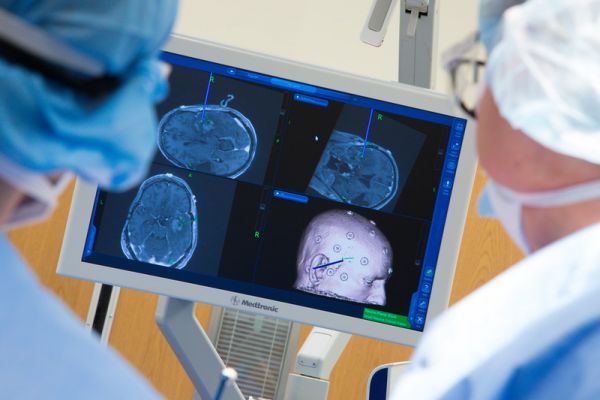Parents do everything they can to keep their children safe and secure. So when an unexpected cancer diagnosis hits, it’s scary to think that you might have passed your cancer risk along to your children. For almost 700,000 Americans living with a brain tumor, there’s one question: “Is it hereditary?”
“No, not generally,” says Robert Fenstermaker, MD, Chair of Neurosurgery at Roswell Park. “Examples of families with numerous individuals who have a primary brain tumor are rare.” Dr. Fenstermaker stresses the importance of understanding the difference between primary tumors, which begin in the brain, and secondary, or metastatic tumors, that develop elsewhere in the body and spread to the brain.
“The real question is whether primary brain tumors are hereditary,” Fenstermaker adds. “Even if other people in your family have developed a brain tumor, it may be due to another form of cancer that started elsewhere in the body. Metastatic tumors are much more common than primary brain tumors, and they are not hereditary.”
Genetic disorders leading to brain tumors
Certain rare genetic disorders may lead to the growth of a primary brain tumor. It is important to remember that not every such condition will lead to a tumor, and not all brain tumors are cancerous. There are more than 120 types of primary brain tumors, both malignant (cancer) and benign (not cancer).
“The most common nervous system tumor syndrome is neurofibromatosis type-1 (NF-1),” says Dr. Fenstermaker. “NF-1 is most likely to lead to gliomas and other tumors of the nerves called neurofibromas.” NF-1 occurs in 1 out of 3,000-4,000 people worldwide, according to the National Institutes of Health.
Primary Brain Tumors
Get even more information about brain cancer and the different types of primary brain tumors.
NF2-related schwannomatosis, which occurs in only one out of 33,000 people, may lead to schwannomas (benign tumors of the nerves) or meningiomas (benign tumors of the brain covering). Other rare genetic disorders such as Von Hippel-Lindau disease and tuberous sclerosis can lead to other types of brain tumors, such as hemangiomas (a noncancerous tumor made of blood vessels) and astrocytomas. Dr. Fenstermaker points out that no two growths are alike: “It’s important to note that tumors may grow at different rates and in different ways.”
There are also families in which brain tumors occur even when there does not seem to be an inherited genetic condition. Such families are quite rare, and research is attempting to understand what is going on in these patients.
Multidisciplinary care is key
“For people diagnosed with primary brain tumors, it’s crucial to come to a comprehensive cancer center, such as Roswell Park,” says Fenstermaker. “Our experts who deal regularly with brain tumors that other hospitals see once every few years.” Dr. Fenstermaker also notes that having a team of brain tumor experts under one roof makes it possible to develop a personalized treatment for every patient using the most advanced technology to yield the best results.
“Believe it or not, not all tumors have to be treated,” Fenstermaker explains. “If it is known which genetic disorder runs in a family, early MRIs may give us a good idea of the approach to take. If a tumor is found, regular scans help determine whether it is actually growing or not. Active surveillance — monitoring the tumor closely but not treating it unless it begins to cause problems — may be the best plan for some patients, so that treatment can be focused on only those tumors that pose a threat.”




